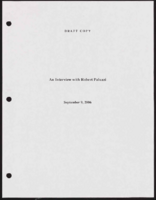Search the Special Collections and Archives Portal
Search Results

Transcript of interview with Frankie Perez by Elsa Lopez and Laurents Bañuelos-Benitez, November 5, 2018
Date
Archival Collection
Description
Frankie Perez (1986- ) is an individual that constantly found himself navigating two worlds, whether it was military versus civilian; female versus male; or being Latinx in the United States. As a result of this navigation, Perez has a unique perspective on our ever more complicated world that not many individuals possess. Perez served in the military during the Do Not Ask, Do Not Tell policy which made it difficult for someone dealing with gender identity, to seek out the proper support they need. Despite the policy, and other policies that were put in place afterwards to inhibit the transgender community in the military, Perez began his transition while still serving his country. In direct contradiction of popular opinion, Perez discovered that the military easily accommodated his transition. Outside of the military Perez is an active voice in the LGBTQ community. As a member of the LGBTQ, Latinx, and military community, Perez has a unique perspective that he uses to fight for both LGBTQ and Latinx rights. Currently, Perez is finishing his degree in gender and sexuality studies at UNLV. He hopes to use his education to help people have the difficult discussions and improve conditions for his communities.
Text

Transcript of interview with Millicent Rosen by Barbara Tabach, June 23, 2015
Date
Archival Collection
Description
Until her passing in 2017, Millicent (Siegel) Rosen was the living link to Benjamin “Bugsy” Siegel, one of Las Vegas’ most notorious links to the Jewish mob. A steadfastly independent woman herself, Millicent recalls Benjamin as a loving father to her and her younger sister. She is proud of his status as a Las Vegas visionary, though she affixes a footnote that the city of today might not be to his liking. She includes a few anecdotes about common names of the early days, including Meyer Lansky who walked her down the aisle when she married Jack Rosen. They had three children: Benjamin, Cindy, and Wendy. Millicent moved to Las Vegas to be with her daughter and her family in about 2000 and cherished her role as a grandmother. Always an artist at heart, Millicent once painted canvases for needlepoint and in 2015 promoted her clothing line.
Text

Transcript of interview with Hazel Hedges by Irene Rostine, October 29, 1997
Date
Archival Collection
Description
Interviewed by Irene Rostine. Hazel Hedges moved from Kansas City to Las Vegas with her husband and son in 1952. She worked briefly as a waitress in the dining room at the Thunderbird and then became a stay at home mom until her son was in junior high. Then after she went to real estate school, she went to work in commercial real estate at Bond Realty. After that, she passed her brokers exam and transferred to Parkway Realty where she sold land. Her primary success in real estate came from selling houses and investing in land and residential properties personally. After leaving Parkway Realty, Hazel went to work for the real estate office Deshoor, Fair, and Davis, which she eventually bought and renamed Southside Realty. Eventually her son joined her, and they operated Hedges and Wade Realty with two offices, one on each side of town. Hazel also did volunteer work including the Assistance League Las Vegas' Operation School Bell Program, which provides clothing for area school children in need.
Text

Eric Calvillo interview, June 18, 2019: transcript
Date
Archival Collection
Description
Interviewed by Monserrath Hernández and Laurents Bañuelos-Benitez. Eric Calvillo was born into a Mexican American household in San Jose, California in 1980. As he recalls, it was there that his fixation with the colors and recurring themes of his family's Mexican roots told hold of his imagination. Today, this is core to his growing art career. Art has not been his sole ambition. Before moving to Las Vegas in 2005, Calvillo attended a San Francisco culinary school. He relocated to Las Vegas to complete his culinary internship at the prestigious Picasso restaurant at the Bellagio. Eventually, he began to pursue a professional art career as a painter of Día de los Muertos motifs and beautifully portray the Mexican tradition of celebrating the lives of the deceased. Through his use of acrylics and oil on canvas, Calvillo conveys the emotion of his culture and then, being a skilled carpenter, crafts his own frames.
Text

Mary Leo interview, February 27, 1980: transcript
Date
Archival Collection
Description
On February 27, 1980, Rafael Reyes-Spindola interviewed Mary Leo (b. Mary Susanne Kaime Leo in 1949 in Santa Barbara, California) about her life growing up in the Las Vegas Valley and her varied career path. Leo, having moved to Las Vegas as a toddler, talks about what the city was like when she arrived, the landscape, schooling and local life in general. She remembers the construction of the University of Las Vegas, Nevada and the growth of the city and population. Through her anecdotes, Leo shares the local attitude towards the Strip that Las Vegans develop as a result of being raised in the city and focuses the beginning half of her interview on life outside of the Strip. The interviewer and Leo move their conversation towards her career path, beginning in a coffee shop at the Riviera Hotel & Casino, her time in the travel industry, as a Las Vegas showgirl in the famed Folies Bergere show, her return to the Riviera as the director of sales and catering, and the legacy she hopes to leave behind with her career.
Text

Transcript of interview with Evelyn Miller McDonald by Maylene C. Cabatingan, February 26 & 27, 1980
Date
Archival Collection
Description
On February 26, and 27, 1980, Maylene C. Cabatingan interviewed Evelyn Miller McDonald (born 1905 in Alderson, West Virginia) about her life in Las Vegas, Nevada. Also present during the interview is Maylene’s step-father (name unknown) who occasionally participates in the conversation. At the time of the interview, McDonald had lived in Nevada for over seventy-two years and described early Las Vegas as a small-town railroad community with few amenities. McDonald discusses her occupational history, and how her father started the first car garage in Las Vegas. She goes on to talk about the impact of the Great Depression on Las Vegas and how Hoover Dam’s construction reduced the severity of the financial depression in comparison to other cities. She then recites the hotels that were built and the appeal that Vegas had to tourists and divorcees. McDonald later discusses how prostitution was accepted by the community, and recalls a story about how local businessmen rallied together to ensure that a minister would preach the funeral for a young woman who had died, despite being a prostitute. McDonald concludes her interview with a brief discussion of her goals in life and her pride in her daughters.
Text

Transcript of interview with Robert Paluzzi by Claytee White, September 5, 2006
Date
Archival Collection
Description
Claytee White interviews Robert Paluzzi on September 5, 2006.
Text

Transcript of interview with Alexandar Grayson by David Glasco, March 15, 1981
Date
Archival Collection
Description
On March 15, 1981, collector David Glasco interviewed card dealer, Alexander Grayson (born March 27th, 1952 in Durham, North Carolina) in his home in Las Vegas, Nevada. This interview covers the black experience in Las Vegas. Mr. Grayson also discusses prejudice, racism, education, and entertainment. Additionally, he recalls relocating to Las Vegas from North Carolina with his family when he was a child, as his father was in the Air Force.
Text

Transcript of interview with John Grayson by Elizabeth Patrick, May 23, 1983
Date
Archival Collection
Description
On May 23, 1983, collector Elizabeth N. Patrick interviewed gaming professional John Grayson (born May 25, 1898 in Grayson, Missouri) at the University of Nevada, Las Vegas. The interview covers John Grayson’s experience with gaming in Arizona, California, and Nevada. Also present during John Grayson’s interview is Billy H. Gray, a longtime gaming associate of his, who helps Mr. Grayson go into greater detail about key events.
Text

Luella Knuckles interview, February 28, 1980: transcript
Date
Archival Collection
Description
On February 28, 1980, Paul Gentle interviewed Luella Knuckles (b. 1910 in Impolla, Texas) about life as an African-American in Las Vegas, Nevada. Knuckles talks to Gentle about the conditions that African-Americans lived in and the discrimination they faced when first arriving to the city. Knuckles, in particular, spends a portion of the interview discussing the segregated layout of Las Vegas and the jobs and opportunities that were available for the black community in a segregated town. Moreover, she provides anecdotes about her deceased husband’s employment, their experience buying and repairing a property by themselves, and the changes in attitudes as the city desegregated. The conversation later focuses on the Church’s place in the African-American community, education and participation in church activities, and Knuckle’s personal love for books and Bible study.
Text
